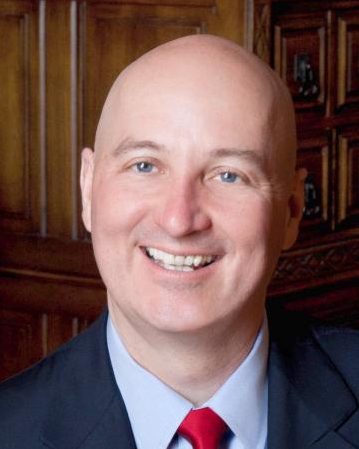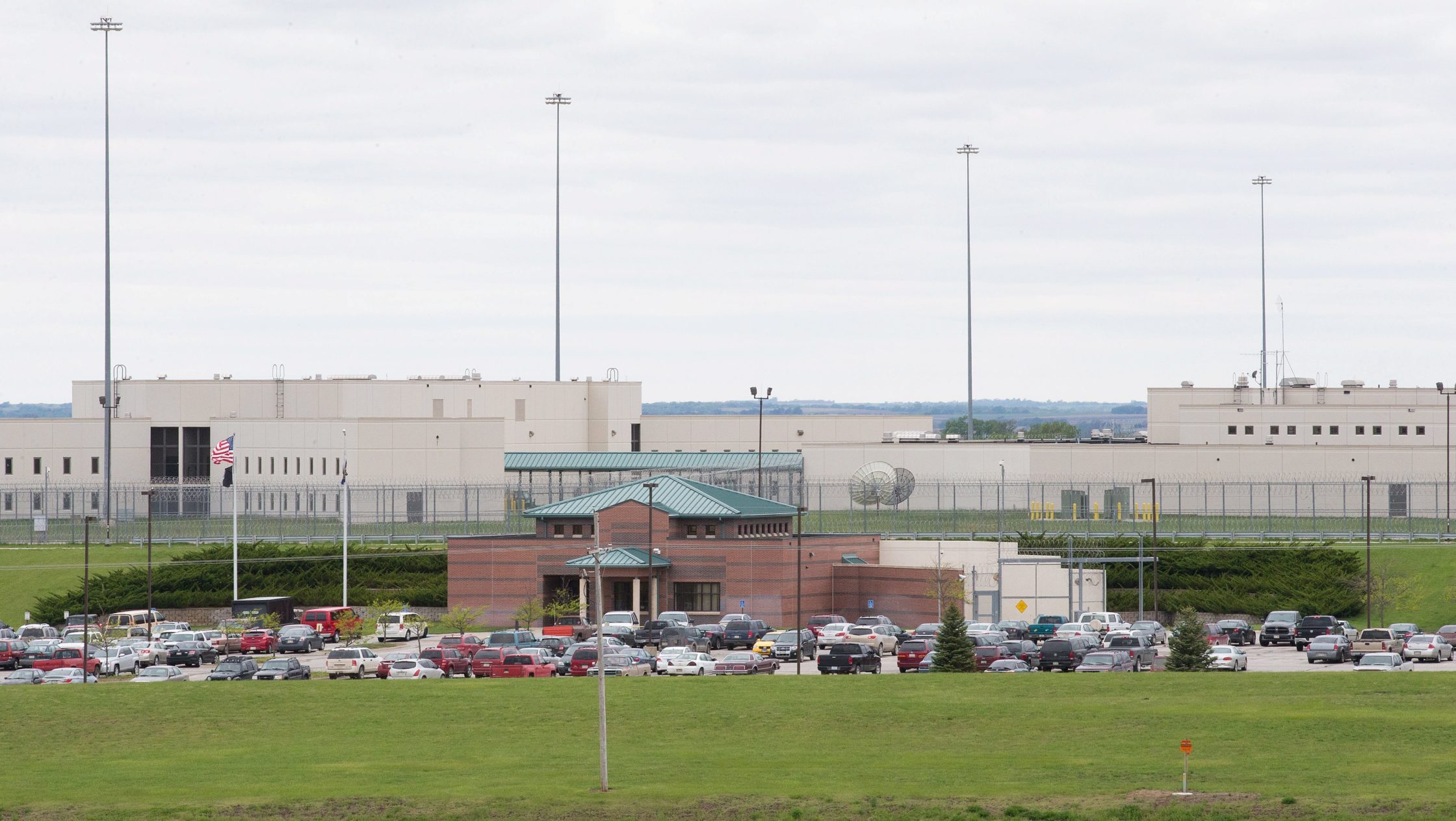If Nebraska wants to reduce chronic prison overcrowding, it’s “a no brainer” to let well-behaved prisoners have a shot at earlier parole as a 2011 law intended, says an expert who helped the Legislature craft policies to reduce overcrowding.
But he doubts that shrinking the prison population is the goal for many state leaders, including Gov. Pete Ricketts.

“This provision…is beneficial if you’re intending to reduce the [prison] population,” said Len Engel, director of policy and campaigns for the Crime and Justice Institute . “Have you heard the governor say anything about his intent being to reduce the [prison] population? I know it’s to build a new prison. But I don’t hear him saying that we need to reduce the population.”
The provision in question is a piece of Nebraska good time law passed in 2011 – after a year behind bars, prisoners could earn three days off their sentence for each month of good behavior. That’s in addition to the day-for-day credit prisoners already earn that effectively cuts sentences in half.
The bill sponsor, then-Sen. Brenda Council, and Bob Houston, director of corrections at the time, agree that the intent of the bill was to let prisoners earn time toward their parole eligibility date, the Flatwater Free Press reported Friday. But the Nebraska Department of Correctional Services argues that state law as written doesn’t allow for that.
The current interpretation of the law – correct or not – quietly contributes to the state’s ongoing struggle with overcrowded prisons, keeping the thousands of parole-eligible prisoners sentenced since 2011 from earning up to 36 days per year toward their parole eligibility date.
The result: They end up having their time before the parole board delayed by days, weeks, or months, potentially keeping them in prison longer than the law’s authors intended.
“This would be a no-brainer if your intent is to reduce the population,” Engel said.

When asked if the governor hopes to shrink the prison population, a spokesperson said the governor prioritizes public safety.
“Nebraska already has a very generous good time law which operates by reducing most sentences in half,” Alex Reuss, Ricketts’ spokesperson, said in an email.
How prison leaders calculate good time and parole eligibility is now being challenged by Nebraska prisoner Robert Heist II. The case now awaits a decision from the Nebraska Supreme Court.
The case comes as the state continues to grapple with one of the most crowded prison systems in the country, reaching 152% of the system’s design capacity in December.
Solving the overcrowding crisis has been a focus of the current legislative session. But state leaders are split in their approaches – some favor sentencing reform and want to build a path for current prisoners out and into community supervision quicker; others want to build a new prison.
“Some of the testimony that we heard during the debate of LB920 indicated to me that some legislators think that there may not be enough people locked up,” Engel said. “It’s not so much about reducing the population as it is about constructing a system that’s big enough to incarcerate all the people you are currently incarcerating.”
Nebraska’s incarceration rate increased 17% since 2011, according to the report issued by the Crime and Justice Institute and a state working group in January. That’s in marked contrast to the national incarceration rate, which has steadily decreased in the same period.
The report included 21 policy options aimed at reducing crime and recidivism. Of the 21 proposals, bipartisan members of the state working group agreed on 17 and disagreed on four. The bill, sponsored by Sen. Steve Lathrop, includes all 21.
Ricketts has said he supports pieces of Lathrop’s bill, largely to do with reducing recidivism. He agrees the state should establish more transitional housing options, improve access to mental health supports, and reduce the number of “jam outs” – when prisoners are released with no supervision in the community.
But the policy options he opposes revolve around sentencing and parole: establishing geriatric parole for elderly prisoners, changing drug possession penalties, and discouraging mandatory minimums and consecutive sentences.
In a press conference Monday, Ricketts called Lathrop’s proposed changes “soft-on-crime bills that would undermine public safety.”
He has urged the Legislature to fund a new prison to replace the aging State Penitentiary in Lincoln “in part because it would provide space for the programming needed to prepare inmates for life after time served and reduce recidivism rates,” Reuss said in an email.

Even with a new building, the prison system is projected to stay over capacity. Laura Ebke, an ex-state senator who chaired the Judiciary Committee, said when the state opened the prison in Tecumseh, in 2001, it was supposed to solve overcrowding for years. Instead, it filled quickly.
“I’m not sure that Nebraskans want to just keep building prisons,” said Ebke, a senior fellow at the Platte Institute, a think tank advocating for reducing taxes and government spending. (The Platte Institute is a supporter of the Flatwater Free Press’ open government efforts).
Nebraska’s prisons are at least slightly more overcrowded because of the current interpretation of the 2011 good time law, which has potentially affected thousands of prisoners who could have had at least a little time shaved off their sentences. But the most egregious cases are prisoners who end up being released before even becoming parole eligible.
When prison leaders credit three days toward a prisoner’s final release date, but never move their parole eligibility date, those dates sometimes flip, creating a group of guaranteed jam outs.
“That’s insane,” said Joe Nigro, the Lancaster County Public Defender.
Parole is generally regarded as a better way to reacclimate prisoners to society. Parolees have required check-ins with their parole officer, and must line up a job and a place to live. Working toward a parole eligibility date is also an incentive for good behavior, the very thing the additional good time days were meant to encourage.
Having those dates flipped is “not what anybody with any common sense would support,” Nigro said.
Aaron Hanson, legislative liaison for the Omaha Police Officers Association, called the state’s current good time laws “clunky at best, and arguably sloppy and haphazard.”
“We need to focus more on achieving better long-term outcomes and less on simply finding new ways to release offenders earlier,” Hanson said. “We want the ultimate goal to be a better outcome, not simply ending supervision or a sentence as early as we can to save money.”
What comes next for the disputed good time days will depend on the court’s opinion, several experts said.
Should the court rule that the department is interpreting the law correctly, the Legislature should step in to ensure the written law reflects that law’s intent, Engel said.
“Sentences in Nebraska are largely defined by the time served on the minimum,” he said. “I think that’s where it’s got to be applied to the parole date. That makes the most sense.”
Lathrop agreed, but said it’s too late in the current legislative session to propose a new bill. It’s also the 12-year senator’s final session. Lathrop announced in February that he wouldn’t seek reelection.
“That would be on the list of things to do I would hand to somebody on my way out, because I’m done,” Lathrop said. “The next best chance to fix that language would be to drop a bill in the next session, and I won’t be around for that.”



